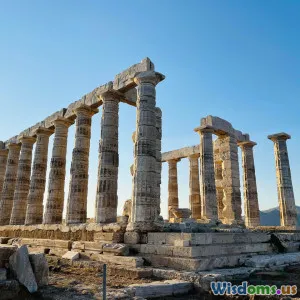
Five Common Misconceptions about Greek Gods Debunked
7 min read Uncover the truth behind five common misconceptions about Greek gods and explore their true myths and significance. (0 Reviews)
Five Common Misconceptions about Greek Gods Debunked
Greek mythology has captivated imaginations for centuries, influencing everything from literature to pop culture. However, many of our perceptions about the gods of Olympus are based on misunderstandings, oversimplifications, or later reinterpretations rather than the original myths and historical contexts. In this article, we will delve into five common misconceptions about Greek gods and reveal the fascinating truths behind them.
1. Zeus: The Ruthless Womanizer
Misconception: Zeus is often portrayed as an incessant philanderer, a god who wanders aimlessly to seduce or deceive mortal and divine women alike, sometimes brutally.
Reality: While Zeus’s numerous liaisons are documented in myth, the stereotype of him as a careless womanizer overlooks his broader role as the king of the gods and protector of order. His affairs are frequently political maneuvers within the divine hierarchy, reflecting the complex interplay of power dynamics rather than simple lust.
For instance, Zeus’s union with Hera was not just a marriage but symbolized the stabilizing force among the Olympians. Moreover, many myths positioning Zeus as romantic or coercive reflect the patriarchal and societal values of ancient Greece rather than an isolated character flaw.
Example: The myth of Europa shows Zeus transforming into a bull to abduct Europa, but this story also served symbolic functions related to Crete’s cultural origins and the spread of civilization, revealing layers beyond just the act of seduction.
2. Athena: The Goddess of Warfare is War-Hungry
Misconception: Athena is often thought of simply as a goddess who craved battle and destruction as a war deity.
Reality: Athena embodies strategic warfare rather than brute combat. She represents wisdom, justice, and skill — fighting not for chaos but for strategic protection and righteous causes.
Athena’s association with crafts, wisdom, and justice highlights her multifaceted nature. For example, her guidance in the Trojan War was more about counsel and strategy than a bloodthirsty desire for battle.
Quote: As Homer's "Iliad" demonstrates, Athena consistently advises warriors to use intelligence over force, showcasing the importance of her role in maintaining balance.
3. Hades: The Evil Underworld Tyrant
Misconception: Hades is commonly imagined as a cruel, malevolent god ruling over a hellish afterlife where souls suffer eternally.
Reality: The Greek underworld, overseen by Hades, was not the place of torment depicted in modern media but a neutral realm where the dead resided. Hades himself was stern and just but not evil.
According to myth, Hades' role was more about maintaining the natural order — ensuring that souls remained in the afterlife rather than escaping — rather than tormenting them.
Example: The myth of Persephone reflects themes of seasonal change and natural cycles, not punishment. The underworld was depicted as a shadowy, subdued place distinct from the fiery hell of later Christian thought.
4. Aphrodite: Merely the Goddess of Physical Beauty and Love
Misconception: Many reduce Aphrodite to the embodiment of superficial beauty and romantic love alone.
Reality: Aphrodite’s domain was far broader, encompassing sexual attraction, procreation, and even political power tied to fertility and prosperity.
Furthermore, Aphrodite’s myths highlight complexities such as the contrast between physical desire and deeper emotional or spiritual connection.
Example: The story of Aphrodite and Adonis demonstrates themes of life, death, and rebirth, linking her to important agricultural cycles and highlighting the goddess’s ties to transformation and power beyond mere allure.
5. The Gods Were Omniscient and Omnipotent
Misconception: Pop culture often depicts Greek gods as all-knowing and all-powerful beings.
Reality: Greek gods had limitations and displayed human-like emotions, making the mythology rich with divine drama and conflict.
They were powerful but not infallible — their failures, jealousies, mistakes, and rivalries form essential plotlines and moral lessons within Greek myths.
Insight: This very human portrayal helped ancient Greeks explore complex themes such as fate, hubris, and morality. For example, Apollo’s wrath or Hera’s vengeance was a reflection of human passions amplified rather than divine perfection.
Conclusion
Greek mythology is a vast and intricate tapestry, blending divine landscapes and human nature. By debunking common misconceptions — Zeus’s lust, Athena’s war frenzy, Hades’ evil, Aphrodite’s superficiality, and the gods’ omnipotence — we reveal a more nuanced and fascinating picture of the ancient world’s gods.
Understanding these myths in their proper cultural and historical contexts enriches our appreciation, allowing us to see them as reflections of humanity’s eternal quest for meaning, power, and understanding. With this deeper insight, the gods of Olympus emerge not just as mythical figures but as timeless symbols of our own human experience.
References
- Kerenyi, Karl. The Gods of the Greeks. Thames & Hudson, 1951.
- Homer. The Iliad. Translated by Robert Fagles, Penguin Classics, 1990.
- Burkert, Walter. Greek Religion. Harvard University Press, 1985.
- Morford, Mark, and Robert Lenardon. Classical Mythology. Oxford University Press, 2018.
Explore these divine complexities yourself and share the truest stories of the Greek gods beyond the myths!
Rate the Post
User Reviews
Popular Posts


















